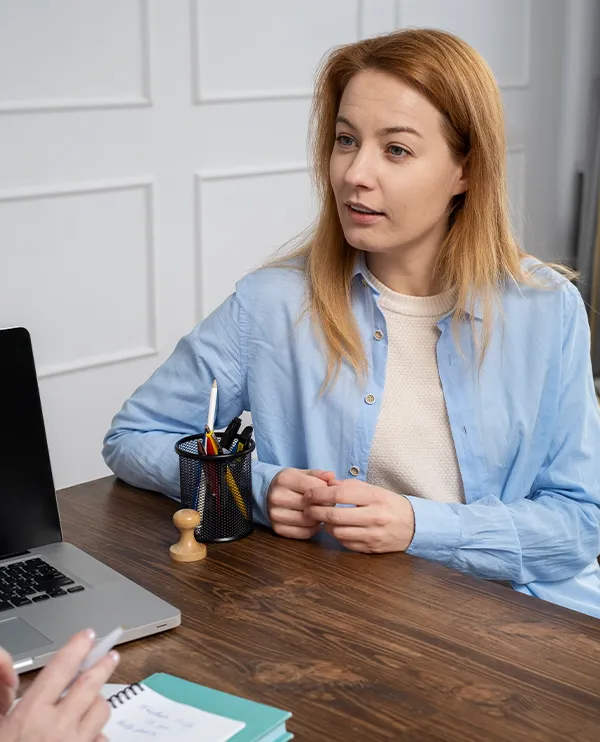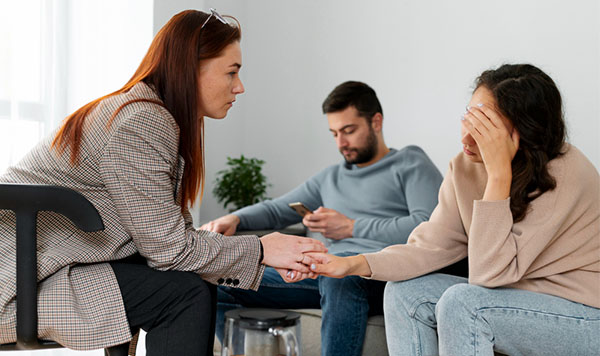Substance Abuse Professional (SAP) in Edmonton
Need to return to duty after a DOT violation? Our certified SAP counsellors in Edmonton guide you through the assessment and treatment process quickly, professionally, and with complete confidentiality—so you can get back to work.
- Fully DOT-qualified SAP services and documentation
- Timely, step-by-step support through every stage of the process
- Convenient in-person or secure online assessments
Substance Abuse Professional (SAP) Services in Edmonton for DOT Compliance
Edmonton Counselling Services provides certified Substance Abuse Professional (SAP) services in Edmonton. If you’ve violated D.O.T. drug and alcohol program rules, we can help. Our substance abuse counsellor specializes in evaluating individuals in these situations and providing effective solutions.
We take a holistic approach to substance abuse counselling, which includes therapy, follow-up testing, and ongoing aftercare support. We understand that addiction and addictive behaviours can be difficult and cause emotional pain for people from all walks of life. Seeking expert guidance is an important step toward a healthier, more positive future.

How Can a Substance Abuse Professional Help You?
Our Substance Abuse Professionals (SAP) in Edmonton provide a wide range of services designed to address substance abuse concerns, ensure compliance with D.O.T. drug and alcohol program regulations, and support your recovery journey. These services include:
Assessments:
We start with a detailed assessment that may include interviews, testing, and a review of your personal history. This allows our team to understand the extent of the substance abuse issue and create a tailored recovery plan. With our guidance, you’ll have a clear path forward.
Treatment Recommendations:
After your assessment, our counsellors provide treatment recommendations that are personalized to your situation. This may involve counselling, therapy, or educational programs. The goal is to connect you with the most effective resources and guide you toward lasting recovery.
Follow-Up Testing:
Ongoing follow-up testing helps track your progress and ensures you remain committed to treatment. We will schedule these tests regularly to confirm your readiness to return to work and to support your long-term recovery and sobriety.
Bharat Sharma, Clinical Counsellor
Bharat Sharma, a qualified Substance Abuse Professional, boasts an impressive array of qualifications and substantial experience in clinical counseling and addiction. With designations like Master Practitioner in Clinical Counselling, Canadian Clinical Supervisor in Addiction, and Mental Health Clinician, he is well-equipped to provide expert guidance for addiction and related mental health concerns. Bharat Sharma’s journey spans over a decade, where he honed his skills in both hospital and community addiction settings.
Bharat Sharma’s specialization lies in critical areas such as safety-sensitive workplace assessments, Fit for Duty evaluations, and return-to-duty processes within his private practice. His distinction as a Canadian Certified Supervisor in Addiction and recognition as a Substance Abuse Professional by the United States Department of Transportation underscore his expertise. Notably, his commitment to clients is evident through comprehensive psycho-bio-social assessments, ensuring tailored treatment options and maximizing the potential for successful recovery.


SAP Assessments For Legal Compliance
If you’re required to complete a SAP assessment for legal reasons like child custody, alcohol or drug charges, or domestic violence, Edmonton Counselling Services can help. Our substance abuse professionals in Edmonton are here to guide you through the process with care and understanding.
Child Custody Cases:
When custody is being decided, the court may ask for an SAP assessment to better understand how substance use affects a parent’s ability to provide a safe and stable home. This step helps ensure the child’s well-being is always the top priority.
Alcohol and Drug Charges:
If you’re facing charges related to alcohol or drug use, a SAP assessment may be part of the legal process. It gives the court a clear picture of your situation and shows your commitment to addressing concerns and taking steps toward recovery.
D.O.T. Violations:
For those working in safety-sensitive roles, a positive drug or alcohol test can require a SAP assessment before returning to duty. This process helps determine readiness, ensures compliance with regulations, and supports you in getting back to work safely.
Role Of Substance Abuse Professionals (SAP) In D.O.T. Compliance
If you work in a safety-sensitive job, it’s important to understand how Substance Abuse Professionals (SAPs) play a role in keeping you and others safe under D.O.T. regulations.
Clearance Process
To return to work, the individual must complete a structured return-to-duty process with the support of a SAP. This includes an evaluation, treatment or education if needed, and follow-up testing. With guidance from a SAP, employees can take the right steps to get back to work safely and in compliance with regulations.
Regulated Jobs
Careers such as bus and truck drivers, train conductors, pilots, and heavy equipment operators are all covered by the Department of Transportation (D.O.T.) rules. These safety sensitive roles require a high level of responsibility and safety.
Random Testing
People in these positions may be subject to random drug and alcohol testing. This ensures that everyone on the job is alert, capable, and not under the influence while performing safety-sensitive tasks.
Positive Test Consequences
If a test comes back positive, the employee must immediately stop performing safety-sensitive duties. This step protects both the worker and the public.

SAP Certification: Online Appointments
Getting the help you need should be straightforward and accessible. That’s why we offer SAP certification online appointments, giving you the flexibility to connect with a certified professional from the comfort of your home. Our team guides you through every step of the process:

Comprehensive Assessment:
We start with a full bio-psycho evaluation, looking at psychological, biological, and social factors. This helps us understand your unique situation and determine the most effective level of care.
Clear Treament Guidance: With professional clinical judgment, our counsellors recommend the right treatment path for you. The goal is to ensure you receive meaningful support and resources that match your needs.
D.O.T. Compliance:
Since the Department of Transportation (D.O.T.) requires that assessments be completed by a qualified SAP, our certified professionals meet all the necessary standards to keep you compliant.
D.O.T. Referrals:
After your assessment, we connect you with treatment or education programs designed to help you move forward. We’ll guide you toward the resources needed to complete your return-to-duty process.
Online Appointment: Scheduling is simple and flexible. Our online appointments make it easier for you to take the first step without the added stress of travel or long wait times.
Substance Abuse Professional Near Me
We know that sometimes travelling far for help isn’t practical. That’s why connecting with a Substance Abuse Professional near you can make the process easier and less stressful. Choosing in-person support offers several benefits:
Quick Assistance
If you need support right away, we can connect you with a certified SAP quickly so you can start your assessment without delay.
Direct Interaction
Meeting face-to-face allows you to build a direct relationship with your counsellor, creating a stronger sense of trust and understanding.
Real-Time Support
You’ll receive immediate guidance and answers to your questions, helping you feel confident as you move through the SAP process.
Comfortable Setting
Many people feel more at ease discussing sensitive issues in a familiar environment, which can make opening up about substance use easier.
Convenience
If you live nearby, in-person assessments provide a quick and simple way to get the help you need without unnecessary travel.


Alcohol Addiction Counselling in Edmonton
If you’re struggling with alcohol addiction, reaching out for professional help can make all the difference. Trying to face it alone can feel overwhelming, and people turn to alcohol for many reasons—stress, trauma, loneliness, or routine habits.
Research shows that people who seek professional counselling for alcohol addiction have much higher success rates in breaking free from harmful patterns. Our sessions combine evidence-based strategies with personalized care, helping you build healthier habits, strengthen coping skills, and find a path toward lasting recovery.
Taking this step is not just about quitting alcohol—it’s about creating a healthier, more fulfilling life. You don’t have to go through it on your own.
One Step Ahead Addiction Counselling
At Edmonton Counselling Services, we believe in staying one step ahead in your recovery journey. Our One Step Ahead Addiction Counselling is designed to help individuals overcome struggles with alcohol, drugs, or gambling and reclaim control over their lives.
Through supportive counselling sessions and professional guidance, many individuals have transformed their lives by building confidence, repairing relationships, and creating a brighter future free from addiction.
If you’re ready to take the first step, our team is here to walk with you. Recovery isn’t just possible, it’s within reach, and it starts right here.


Take the First Step Toward Compliance and Recovery
Facing a D.O.T. violation or being asked to complete a SAP assessment can feel overwhelming—but you don’t have to go through it alone. Our certified Substance Abuse Professionals in Edmonton are here to guide you through every step with understanding and support.
Whether you need an assessment, treatment recommendations, or follow-up testing, we’ll help you meet D.O.T. requirements and move forward with confidence. This isn’t just about compliance—it’s about taking a meaningful step to stop taking harmful substances and work toward a healthier, safer future.
